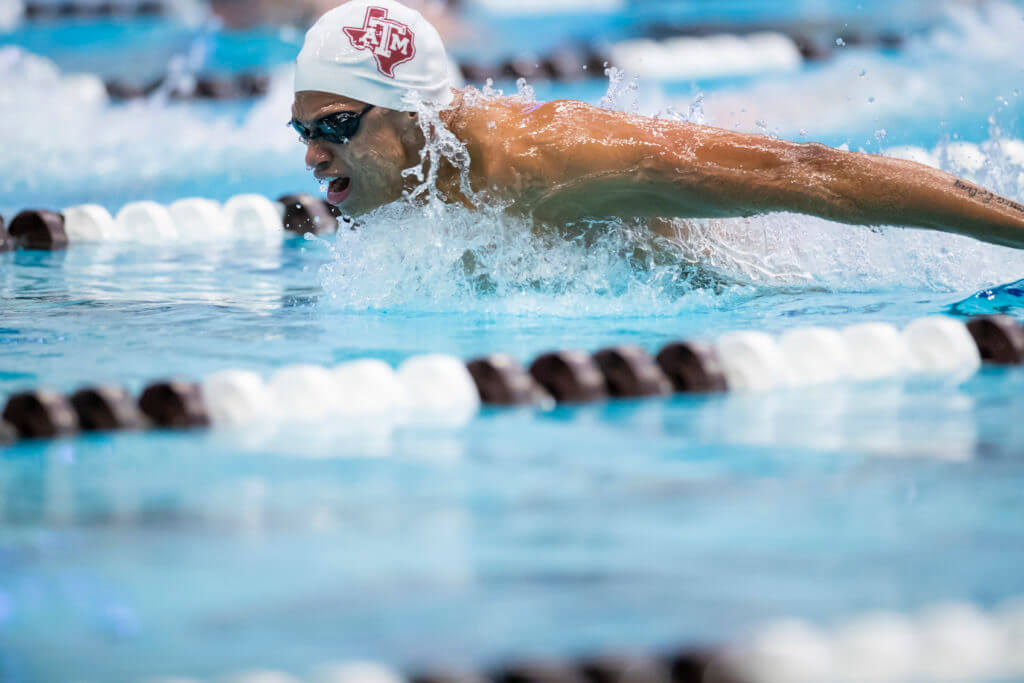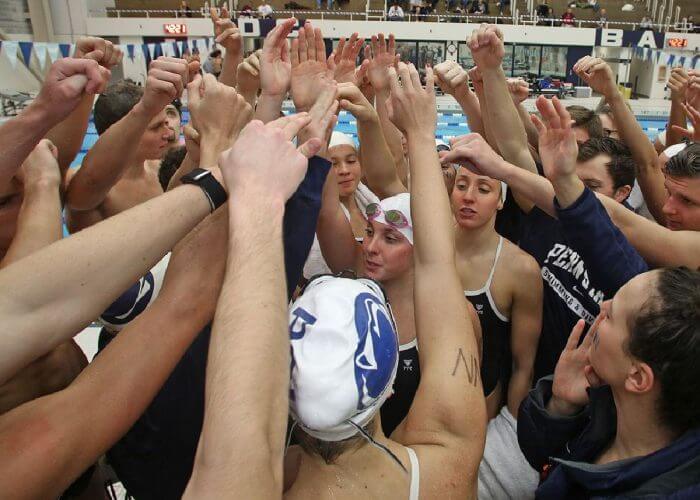The Next Level: 3 Key Differences Between High School and College Swimming

The Next Level: 3 Key Differences Between High School and College Swimming
To swim or not to swim?
Eventually, every high school-level athlete will face this question sooner or later. And sometimes it can be very difficult to decide what the best course of action might be. Change can be both exciting and scary at the same time. Questions swirl, each one harder to answer than the last.
How much time does college swimming take up? Will I like the environment? Do I care enough about the sport to continue? Just how different will college be from high school?
There really isn’t one “correct” answer to any of these questions. However, if you truly enjoy swimming, staying in the sport is a wonderful way to stay active while in college. Here are three examples of how college swimming differs from high school swimming and some ways that you can make your decision a little easier.
1. A Higher Level of Commitment
“Year-round swimmers are used to commitment! They know what 5 a.m. practices before classes are and training doubles over winter break. They are familiar with missing the high school football conference championship game because they have swim practice,” Michelle Lombana writes on the College Swimming Guide website.
Lombana later points out that swimmers who go to college far away from their families may have few opportunities to visit home. Many college students utilize a long winter break in order to travel and see family members. But collegiate swim teams, especially teams at the Division I level, practice during the winter time. This means that many swimmers must stay close to their team and close to campus in order to continue practicing.
It’s not like high school, where meets are one or two hours long and the swimmers return home immediately after. Collegiate athletes will go weeks or months at a time without returning home. That can be hard for some people, so it’s an important thing to keep in mind.
There is also the matter of morning practices. As a high school athlete, swimming was important… but you could afford to skip a morning practice or two. In college, that simply won’t cut it. College demands a greater level of commitment and practice time. If you sign on to swim at the college level, regardless of division, you must be prepared to come to every practice and give your best effort at every one. If you don’t, it’s likely that you won’t swim very many events in meets.
When choosing whether to swim in college, you must first evaluate what you want to accomplish and decide whether or not you can commit to being a full-time swimmer.
2. A Tight-Knit Environment
Sure, you liked your teammates in high school. I did, too.
But you didn’t have to live with them everyday. You didn’t have to be their roommate. In fact, you didn’t even have to talk to them much at all if you didn’t want to!

Photo Courtesy: Craig Houtz | Penn State Athletics
In college, that all changes. If you’re prepared to commit to being a college athlete, it’s important that you get to know and understand and really like the people you’ll be training with everyday. Because, if you devote a lot of your time to swimming, that leaves less time for you to get into other actives and make new friends that way. In college, your swim team and coach will be the people you’re around the most. You train together, eat together, room together, and get up insanely early in the morning together. It’s exhausting just to think about!
So, naturally, a lot of swimmers become good friends with the people on their team. It’s much easier to swim with people you like than people who make you miserable. This becomes even more relevant when you’re around them every day.
For rising seniors and juniors interested in collegiate swimming, it’s recommended that they go on an overnight visit to their top few colleges and stay with members of the team. The new athletes must first be comfortable with the people they’ll be around for most of their career. If the environment seems off-putting or uncomfortable, that school or program may not be a good fit.
3. A Higher Level of Academics

Photo Courtesy: pixabay.com
We’ve already talked about commitment. So now let’s talk about how that commitment takes time away from… school.
College demands a higher level of swimming. But, it also demands a higher level of schooling. Athletes, especially those who get swimming scholarships, can find their new workload overwhelming. Grades could slip, no matter how hard an athlete tries to keep them up.
In high school, courses were not as difficult and athletes didn’t have as much variety in their subject choices. In college, it is the athlete who forges their own schedule and decides how difficult they want to make it. Majors and minors demand a lot of time and energy – just like swimming. This can result in some seriously overworked swimmers, which is not a good thing.
Luckily, many college athletic programs offer tutoring in order to help their students keep up with their classes and practices. But an athlete must be willing to admit that they need help in order to get it. Getting help is OK, especially if it allows you to continue doing the thing you love. And if you can’t keep up with your grades like you did in high school… that’s perfectly fine! College is supposed to be a challenge. Knowing when you need help is important.
When deciding what school to swim at, it is important to evaluate what kind of majors and minors you want to study and where swimming would fit into it all.
This article explains the college recruitment process more in depth and also breaks down the three different divisions of college swimming: An Important Choice: Breaking Down the College Swimming Decision.
The Next Step
As a rising high school junior, I know how hard it can be to decide what you want to get out of your swim career. I still don’t know what level I want to swim at and I still haven’t decided how much I’m willing to give to the sport. But that’s okay! You don’t have to have all the answers right away and making mistakes can be part of the journey.
All in all, the best advice I can give you is to make a choice that seems to work for you, and have fun!
All commentaries are the opinion of the author and do not necessarily reflect the views of Swimming World Magazine nor its staff.




Good and informative article.
‘Mistakes are part of the journey’
The truth!
Bob.Niebauer@gmail.com
I enjoyed reading this article to learn more about the choices that talented young people must make as they finish up their high school years.
Opportunities come along and at times seem ominous. Thinking through the process like the author suggests and talking through options with parents and trusted friends help.
A lot of this article rings true as a college swimmer however I swam for a D3 program that prioritized academics and whole person development over swimming. Definitely look at the program and learn the philosophy of the coach before committing to a program.